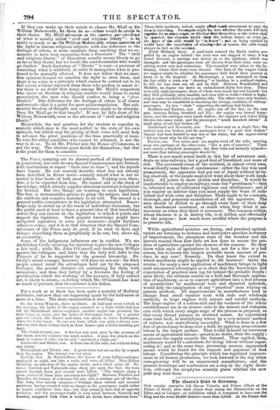For a week or so there has been quite a
scarcity of Railway accidents ; but now they are happening again by the half-score or more at a time. The mere enumeration is startling.
On the Great Western, three accidents. At half-past seven o'clock in the morning, the boiler of the engine attached to a train which had just left the Maidenhead station exploded: another engine was procured, the train began to move, and the boiler of that engine burst. At a quarter past ten o'clock, the Exeter mail-train was about to leave Paddington, when the boiler burst. No one was hurt; which was quite a favour, con- sidering that three boilers burst in three hours—just a boiler-bursting per lour.
The South-western, one. A fire-box was rent open by the pressure of the steam, and, the engineer was much scalded. A man was struck on the head by a piece of coke, but he only "sustained a slight cut."
Gloucester and Bristol, one. A train ran off the rails, but without doing any injury.
Birmingham and Bristol, one. A goods-train was set on fire by a spark from the engine. The damage was not great.
Norfolk, five. At Wymondham, the horses of some ballast-carriages, employed at night, ran into a train, and were all killed. Near Bishop Stortford, an axle-tree of the engine broke, and a wheel came off. Be- -tween Norwich and Yarmouth some sheep got upon the line; the train passed through them, and several were killed. "The battens along a great portion of these lines are much too slight." Between Thetford and Brandon, the bottom of a furnace fell out; also a carriage got off the line. The Bury Post naively observes—" Perhaps these various and unusual accidents, having occurred with no danger to the passengers, ought rather to inspire confidence than fear: but they certainly have had an opposite tendency, and the passenger-traffic is very small between Norwich and London, compared with what it would no doubt have otherwise been." These little incidents, indeed, might,affenVmeelt amusement to pass the tireain travellisig, Passengers might lay bets- whether the train will hold together forissteany stages, or *hether they themselves or the stoker shall be smashed; the suspeale would cheat the tedious hours: at every jar, the Sayer of the ‘odds Would be "is lopes" ; and on being crushed he would have the consolation oft winnlag--for; et course, the odds would always be laid on the accident.
North Midland, three. A mail-train entered the Derby station pro- pelled by an engine behind: the train was not stopped in time; it was forced forward; a carriage was driven on to the platform, which was damaged; and the passengers were all thrown from their seats, some re- ceiving severe cuts and contusions. The wounded were taken to the In- firmary, where their hurts were dressed. One form of the wagers which we suggest might be, whether the passengers shall finish their journey at home or in the hospital. At Idasborough, a man attempted to cross the line while a train was " shunting " or backing in a confined station; he fell, his legs were out off, and he died. Between Woodlesford and Methley, an engine ran down an embankment thirty feet deep. There were only eight passengers, three of whom were much cut and bruised; but they bled profusely, were sensible, and even able to walk—which is begin- ning to seem wonderful after a railway ride. The others were only bruised; and that may be considered as becoming the average condition of railway- passengers. An iron " chair " supporting the railway had broken. Northern and Eastern, one. An engine ran off the line, on the new part, between Bishop Stortford and Ely: the engine was turned topsy- turvy, and the carriages were much shaken; the engineer and stoker being thrown into some water, and the passengers "much knocked about." A small piece of rail had broken off. Sunderland and Newcastle, one. Two trains met on a single line: the stoker's arm was broken, and the passengers were "a good deal shaken." Signals had been hoisted to stop one of the trains, but the engine-driver "did not know why he did not stop." Preston, one. Two trains met: one engine went off the rails, carrying away two carriages of the other train, "like a pair of panniers." Thera were nearly a hundred passengers; but they were not seriously injured.— not more than railway-passengers should be.
There is not much actual death in this list of seventeen acci- dents on nine railways, but a good deal of bloodshed, and more of risk. The proximate cause of the accident, in almost every case, was evidently some form of carelessness : either the line was used prematurely, the apparatus had got out of repair without its be- ing observed, or the people employed went about their work heed- lessly. All points to more system and discipline. It would be impracticable to employ onrailways none but "gentlemen"—that is, educated men of cultivated vigilance and intelligence ; and if you employ an inferior class you must supply the want of indi- vidual tact with rules and discipline. There ought to be a minute, thorough, and perpetual examination of all the apparatus. The men should be drilled to go through every form of their duty with mechanical exactness, as much when they think it up, necessary as when they think it necessary. The common soldier, whose business it is to destroy life, is so drilled, and effectually for the purpose : how much more needful where the purpose is to preserve life.


























 Previous page
Previous page